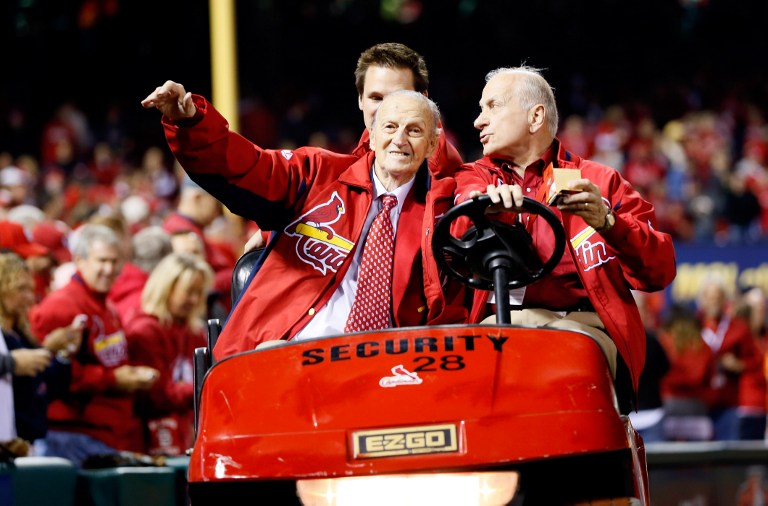Baseball: Hall of Famer Stan Musial dies

ST LOUIS, MO – OCTOBER 18: St. Louis Cardinals great Stan Musial (L) waves to the crowd before the Cardinals take on the San Francisco Giants in Game Four of the National League Championship Series at Busch Stadium on October 18, 2012 in St Louis, Missouri. Kevin C. Cox/Getty Images/AFP
ST. LOUIS, Missouri — Hall of Famer Stan Musial, one of baseball’s greatest hitters and a St. Louis Cardinals icon, died Saturday at the age of 92.
“We have lost the most beloved member of the Cardinals family,” Cardinals chairman William DeWitt jnr said in a statement. “Stan Musial was the greatest player in Cardinals history and one of the best players in the history of baseball.”
The team said Musial died at his home in St. Louis. He is survived by his children Richard, Gerry, Janet and Jean as well as 11 grandchildren and 12 great-grandchildren.
Lillian Musial, his wife of more than 70 years, had died last May, and Musial had been in declining health.
Nicknamed “Stan the Man,” Musial played his entire 22-year Major League Baseball career with the Cardinals. He was a 24-time All-Star and a first-ballot Hall of Fame selection in 1969.
Musial won seven National League batting titles, was a three-time Most Valuable Player and helped St. Louis win three World Series titles in the 1940s.
Musial was signed by the Cardinals as a pitcher in 1938, but made his major league debut with them as an outfielder in 1941.
In 1948, he hit a career-high .376 to win the batting title, smacked 39 home runs, drove in 131 runs and scored 135.
In 1957, Musial became the first $100,000 player, and he won the last of his seven batting titles that season.
At the time of his retirement, Musial held or shared 17 major league records, 29 National League records, and nine All-Star Game records.
Musial served as the Cardinals’ general manager in 1967 and then quit after his team won both the National League title and World Series that year.
Presented with the presidential medal of freedom by President Barack Obama in 2011, Musial is also honored with a statue at the Cardinals’ Busch Stadium.
Musial was also a beloved ambassador of the game, with a ready smile and a knack for playing the harmonica.
Fellow Hall of Famer Red Schoendienst recalled the days when they roomed together as teammates.
“A lot of times we would go visit kids in hospitals whenever we were on the road,” Schoendienst once said. “He didn’t want publicity for it, and he didn’t do it to seek recognition or humanitarian awards. He just did it because he thought it was the right thing to do. He enjoyed making other people happy and maybe give them a small ray of sunshine to brighten up their lives.”